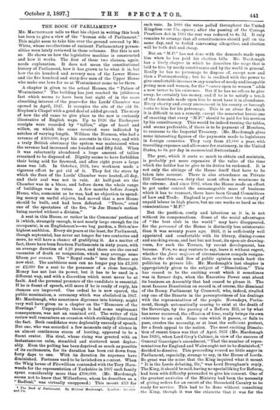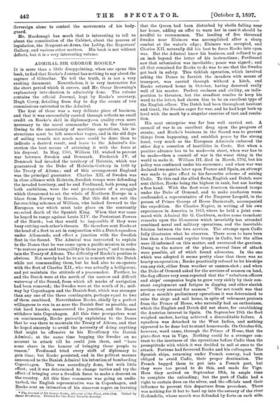THE BOOK OF PARLIAMENT. * MB. MACDONAGH tells us that his
object in writing this book has been to give a view of the "human side of Parliament." This might seem to take him over the ground covered by Mr. White, whose recollections of eminent Parliamentary person- alities were lately reviewed in these columns. But this is not so. He shows us how the legislative machine is constructed and how it works. The first of these two clauses, again, needs explanation. It does not mean the constitutional history of Parliament, how it has grown to be what it is, but how the six hundred and seventy men of the Lower House and the five hundred and sixty-five men of the Upper House who make our laws for us at Westminster come to be there.
A chapter is given to the actual Houses, the 4. Palace of Westminster." The building has just reached its jubilee—a fact which seems to have been lost sight of in the more absorbing interest of the year—for the Lords' Chamber was opened in April, 1847. It occupies the site of the old St. Stephen's Chapel with a good deal of added ground. The story of how the old came to give place to the new is curiously illustrative of English ways. Up to 1826 the Exchequer receipts were recorded by " tallies," slips of hazel and willow, on which the sums received were indicated by notches of varying length. William the Norman, who had a revenue of £400,000, kept his accounts in this way, and with a truly British obstinacy the system was maintained when the revenue had increased one hundred and fifty fold. When it was reluctantly abandoned a huge amount of tallies remained to be disposed of. Dignity seems to have forbidden their being sold for firewood, and after eight years a large mass was left. In October, 1834, two workmen made a vigorous effort to get rid of it. They fed the stove by which the flues of the Lords' Chamber were heated, all day, and their zeal was not in vain. At half-past six the Chamber was in a blaze, and before dawn the whole range of buildings was in ruins. A few months before Joseph Hume, who, economist as he was, had no objection to spend- ing money on useful objects, had moved that a new House should be built, and had been defeated. "There," cried one of the spectators of the fire, " is Joe Hume's motion being carried without a division."
A seat in this House, or rather in the Commons' portion of it (which, strangely enough, is not nearly large enough for its occupants), is an Englishman's—we beg pardon, a Briton's— highest ambition. Every six years at the least, for Parliament, though septennial, has never sat longer for two centuries and more, he will have a chance of gratifying it. As a matter of fact, there have been fourteen Parliaments in sixty years, with an average duration of 428 years, and there are the cas nal vacancies of death or resignation, which may average some fifteen per annum. The " Royal roads" into the House are now shut. The ambitious man can no longer pay his £1,500 or £2,000 for a seat to the possessor of a close borough. Money has not lost its power, but it has to be used in a different way, and with a discretion which must never be at fault. And the personal presence of the candidate is essential. If he is fluent of speech, still more if he is ready of reply, his chances are improved. One ordeal he is now spared, the public nomination, a ceremony which was abolished in 1867. Mr. Macdonagh, who sometimes digresses into history, might very well have given us a chapter on the "Humours of the Hustings." Unpopularity, though it had some unpleasant consequences, was not an unmixed evil. The writer of this review well remembers an occasion which strikingly illustrated the fact. Both candidates were deplorably unready of speech. But one, who was accorded a few moments only of silence in an almost continuous storm of hooting, appeared to be a fluent orator. His rival, whose rising was greeted with an instantaneous calm, stumbled and stuttered most deplor- ably. Even the polling has been deprived as much as possible of its excitements, for its duration has been cut down from forty days to one. With its duration its expenses have diminished. Fortunes used to be lavished on a contest. When the Whig house of Fitzwilliam contended with the Tory Hare. woods for the representation of Yorkshire in 1807 each family spent considerably more than £100,000. (Mr. Maedonagh seems not to know that Wilberforce, whom he describes as a "Radical," was virtually unopposed.) This meant £13 for • The Book of Parliament. By Michael Macdonagh. London: Im.:ster and Co. each vote. In 1880 the votes polled throughout the United Kingdom cost 15s. apiece; after the passing of the Corrupt Practices Act in 1883 the cost was reduced to 4s. 3d. It only remains to arrange that all constituencies should poll on the same day, and to forbid canvassing altogether, and election will be both dull and cheap.
But an " M.P." has not done with the demands made upon him when he has paid his election bills. Mr. Macdonagh has a lively chapter in which he describes the siege that is laid to him by needy constituents and by the world in genera Really he has no patronage to dispose of, except now and then a Postmastership ; but he is credited with the power to give comfortable incomes t" any number of needy and incapable young men and women, for the " career open to women " adds a new terror to his existence. But if he has no offices to give away, he certainly has money, and if he is to satisfy a ten:11 of the demands made upon him he must have it in abundance. Every charity and every amusement in his county or borough looks to him for his patronage. This is an abuse for which it is difficult to see a remedy, except the somewhat heroic one of enacting that every "M.P." should be paid for his services by his constituency. This would be indeed turning the tables, and seems preferable, if there is to be payment of Members, to recourse to the Imperial Treasury. (Mr. Macdonagh gives some interesting figures of the payments made to legislators in foreign countries. They vary from 21,000 a year, with travelling expenses and allowance for stationery, in the United States, to 6s. per day in economical Switzerland.) The post, which it costs so much to obtain and maintain, is probably yet more expensive if the value of the time which the holder has to give to its duties be reckoned. It is not only the sittings of the House itself that have to be taken into account. There is also attendance on Private Bill Committees,—a duty that must often be wearisome in the extreme. And since 1882, when the House made an effort to get under control the unmanageable mass of business which it has to transact, there have been Grand Committees of Law and Trade. England is par excellence the country of unpaid labour in high places, but no one works so hard as the conscientious " M.P."
But the position, costly and laborious as it is, is not without its compensations. Some of the social advantages of " the best club in the world " may have disappeared, for the personnel of the House is distinctly less aristocratic than it was seventy years ago. Still, it is sufficiently well appointed and comfortable with its library, dining-rooms and smoking-room, and last but not least, its open-air drawing- room, for such the Terrace, by recent development, has become. Few, we may venture to say, leave it without regret, whether the force majeure of circumstances compels resigna- tion, or the ebb and flow of public opinion sends back the politician to private life. Mr. Macdonagh's last chapter is appropriately given to the subject of "Dissolution?' This has ceased to be the exciting event which it sometimes was in former days, when the Executive Power sent about its business an Assembly that had ceased to please it. The most famous Dissolution on record is, of course, the dismissal of the Rump Parliament by Cromwell, who, indeed, rivalled any one of the Stuarts in the peremptoriness of his dealings with the representatives of the people. Nowadays, Parlia- ment, though automatically ceasing to exist at the death of the Sovereign, by the passing of a Reform Bill, or by what has never occurred, the effiuxion of time, really brings its own existence to an end. Some vote which it passes, or fails to pass, creates the necessity, or at least the sufficient pretext, for a fresh appeal to the nation. The most exciting Dissolu- tion of recent times was that of April, 1831 (Mr. Macdonagh has 1830), when Lord Grey's Cabinet, in view of the success of General Gascoigne's amendment, " That the number of repre- sentatives for England and Wales ought not to be diminished," decided to dissolve. This proceeding roused no little anger in Parliament, especially, strange to say, in the House of Lords. So great was the noise that the King inquired what it meant " It is the Lords debating, Sir," was Lord Brougham's reply. The King, it should be said, having no special liking for Reform, had been with difficulty persuaded to give his consent. One of the greatest anxieties of the Ministry had been the necessity of giving orders for an escort of the Household Cavalry to be ready for service. This had to be done without consulting the King, though it was the etiquette that it was for the Sovereign alone to control the movements of his body- guard.
Mr. Macdonagh has much that is interesting to tell us about the constitution of the Cabinet, about the process of legislation, the Sergeant-at-Arms, the Lobby, the Reporters' Gallery, and various other matters. His book is not without defects, but it is a very interesting volume.







































 Previous page
Previous page